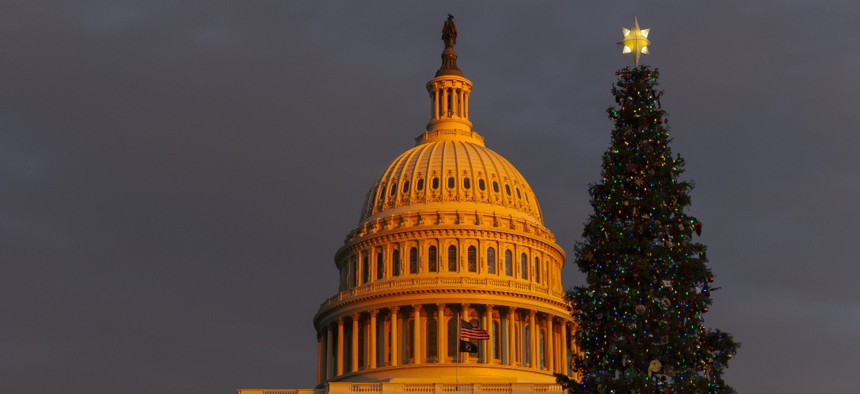
Kerem Yucel/Anadolu Agency via Getty Images
House Approves Sweeping Reforms to Protect Feds, Boost Agency Oversight
Just one Republican votes in favor of the changes to whistleblower, inspector general, vacancy and other civil service laws.
The House on Thursday approved a package of reforms to add new protections to federal civil servants, further empower agency watchdogs and limit who can lead federal offices on a temporary basis.
The 2021 Protecting Our Democracy Act (H.R. 5314) includes sweeping changes to the executive branch, ranging from new limitations on presidential power to protecting elections from foreign interference. Much of the bill seeks to ensure federal employees and political appointees are held accountable, protected from undue retaliation and acting ethically. Republicans voiced nearly unanimous opposition to the bill, saying it was backward-looking and provided undue favoritism to government bureaucrats. Rep. Adam Kinzinger, R-Ill., was the lone Republican to vote in favor of the bill.
“The bill the majority has titled [the] 'Protecting Our Democracy Act' does nothing to protect anything but the swamp,” said Rep. James Comer, R-Ky., the top Republican on the House Oversight and Reform Committee.
Several provisions in the bill seek to provide additional oversight and restrict the powers of the office of the president, which Republicans on the House floor repeatedly highlighted as an effort to relitigate the past and punish former President Trump. Democrats pushed back on that argument, with House Oversight and Reform Committee Chairwoman Rep. Carolyn Maloney, D-N.Y., saying those measures were aimed at President Biden and all future presidents. House Speaker Nancy Pelosi, D-Calif., added the measure is “sweeping and future focused.”
Without Republican support, the measure faces a bleak future in the Senate. It will most likely require at least 10 Republican senators to vote in favor to become law. Rep. Adam Schiff, D-Calif., who authored the legislation, said Republicans have supported many of the provisions of the bill in the past and said the Senate should make carve-outs to filibuster rules to allow for the bill's passage. If the measure does somehow find its way to President Biden’s desk, here is a look at some of its major provisions affecting federal agencies and their employees.
Oversight
The Protecting Our Democracy Act would create new enforcement mechanisms for the Hatch Act, a law that prevents federal employees from engaging in political activities while acting in an official capacity. Under the bill, some workers would be subject to fines of up to $50,000 for violating the law. The president and vice president would be newly subject to the Hatch Act while conducting official duties at the White House.
Inspectors general would secure more protections making it harder for the president to fire them, which follows Trump controversially removing multiple IGs during his tenure. The White House’s Office of Management and Budget would get its own inspector general under a Republican amendment the House agreed to on Wednesday. OMB would also face new restrictions in effectively blocking the disbursement of appropriated funds just before they expire, as Trump briefly considered doing. Rep. Rosa, DeLauro, D-Conn., who chairs the House Appropriations Committee, said the provision would “ensure every president, regardless of party, will be subject to Congress’ constitutional power of the purse.”
Whistleblower and Workforce Reforms
The bill would clarify that retaliation against whistleblowers is prohibited, while ensuring that retaliatory investigations cannot occur. Republicans objected to this provision, suggesting it would prevent agencies from looking into the wrongdoing or poor performance of any employee who claimed reprisal. Another provision would guarantee protection for whistleblowers who take their concerns directly to Congress.
The measure would reauthorize the Merit Systems Protection Board, give it subpoena authority and allow it to conduct surveys of the federal workforce. The Office of Special Counsel—an independent agency that enforces the Hatch Act and whistleblower protection laws—would gain rulemaking authority and the ability to continue investigating some employees after they leave government. The bill would codify Biden’s repeal of Trump’s Schedule F executive order—which sought to make a significantly larger portion of the civil service easier to fire by subjecting them to at-will employment—and make such a reform unlawful in the future.
Temporary Leadership
The Protecting Our Democracy Act makes significant changes to the Federal Vacancies Reform Act, another law that attracted significant attention under Trump. The changes would require acting officials who temporarily take over a position after serving as its deputy to have been in that No. 2 role for at least 30 days before the vacancy. In some instances, Trump appointed an individual to a brand new deputy position only so they could immediately serve as an acting agency leader without Senate approval. Senior career officials would have to serve at an agency for one year before they could serve as an acting leader. The bill would bring the maximum time acting officials can serve down from 210 days to just 120.







